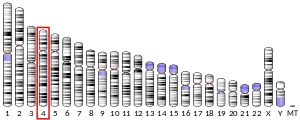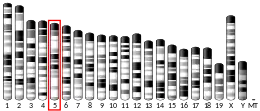CC2D2A
Coiled-coil and C2 domain-containing protein 2A that in humans is encoded by the CC2D2A gene.[5][6][7]
| CC2D2A | |||||||||||||||||||||||||
|---|---|---|---|---|---|---|---|---|---|---|---|---|---|---|---|---|---|---|---|---|---|---|---|---|---|
| Identifiers | |||||||||||||||||||||||||
| Aliases | CC2D2A, JBTS9, MKS6, coiled-coil and C2 domain containing 2A | ||||||||||||||||||||||||
| External IDs | OMIM: 612013 MGI: 1924487 HomoloGene: 18159 GeneCards: CC2D2A | ||||||||||||||||||||||||
| |||||||||||||||||||||||||
| |||||||||||||||||||||||||
| Orthologs | |||||||||||||||||||||||||
| Species | Human | Mouse | |||||||||||||||||||||||
| Entrez | |||||||||||||||||||||||||
| Ensembl | |||||||||||||||||||||||||
| UniProt | |||||||||||||||||||||||||
| RefSeq (mRNA) | |||||||||||||||||||||||||
| RefSeq (protein) | |||||||||||||||||||||||||
| Location (UCSC) | Chr 4: 15.47 – 15.6 Mb | Chr 5: 43.66 – 43.74 Mb | |||||||||||||||||||||||
| PubMed search | [3] | [4] | |||||||||||||||||||||||
| Wikidata | |||||||||||||||||||||||||
| |||||||||||||||||||||||||
Function
This gene encodes a coiled-coil and calcium binding domain protein that appears to play a critical role in cilia formation.[5]
Clinical significance
Mutations in the CC2D2A gene are associated with Meckel syndrome as well as Joubert syndrome.[5]
References
- GRCh38: Ensembl release 89: ENSG00000048342 - Ensembl, May 2017
- GRCm38: Ensembl release 89: ENSMUSG00000039765 - Ensembl, May 2017
- "Human PubMed Reference:". National Center for Biotechnology Information, U.S. National Library of Medicine.
- "Mouse PubMed Reference:". National Center for Biotechnology Information, U.S. National Library of Medicine.
- "Entrez Gene: coiled-coil and C2 domain containing 2A".
- Nagase T, Kikuno R, Ishikawa KI, Hirosawa M, Ohara O (February 2000). "Prediction of the coding sequences of unidentified human genes. XVI. The complete sequences of 150 new cDNA clones from brain which code for large proteins in vitro". DNA Res. 7 (1): 65–73. doi:10.1093/dnares/7.1.65. PMID 10718198.
- Tallila J, Jakkula E, Peltonen L, Salonen R, Kestilä M (June 2008). "Identification of CC2D2A as a Meckel syndrome gene adds an important piece to the ciliopathy puzzle". Am. J. Hum. Genet. 82 (6): 1361–7. doi:10.1016/j.ajhg.2008.05.004. PMC 2427307. PMID 18513680.
External links
- Human CC2D2A genome location and CC2D2A gene details page in the UCSC Genome Browser.
Further reading
- Mougou-Zerelli S, Thomas S, Szenker E, et al. (2009). "CC2D2A mutations in Meckel and Joubert syndromes indicate a genotype-phenotype correlation". Hum. Mutat. 30 (11): 1574–82. doi:10.1002/humu.21116. PMC 2783384. PMID 19777577.
- Ota T, Suzuki Y, Nishikawa T, et al. (2004). "Complete sequencing and characterization of 21,243 full-length human cDNAs". Nat. Genet. 36 (1): 40–5. doi:10.1038/ng1285. PMID 14702039.
- Noor A, Windpassinger C, Patel M, et al. (2008). "Addendum. CC2D2A, encoding a coiled-coil and C2 domain protein, causes autosomal-recessive mental retardation with retinitis pigmentosa". Am. J. Hum. Genet. 83 (5): 656. doi:10.1016/j.ajhg.2008.10.005. PMC 2674770. PMID 19068953.
- Dick DM, Aliev F, Krueger RF, et al. (2010). "Genome-wide association study of conduct disorder symptomatology". Molecular Psychiatry. 16 (8): 800–808. doi:10.1038/mp.2010.73. PMC 3580835. PMID 20585324.
- Strausberg RL, Feingold EA, Grouse LH, et al. (2002). "Generation and initial analysis of more than 15,000 full-length human and mouse cDNA sequences". Proc. Natl. Acad. Sci. U.S.A. 99 (26): 16899–903. doi:10.1073/pnas.242603899. PMC 139241. PMID 12477932.
- Kimura K, Wakamatsu A, Suzuki Y, et al. (2006). "Diversification of transcriptional modulation: large-scale identification and characterization of putative alternative promoters of human genes". Genome Res. 16 (1): 55–65. doi:10.1101/gr.4039406. PMC 1356129. PMID 16344560.
- Noor A, Windpassinger C, Patel M, et al. (2008). "CC2D2A, encoding a coiled-coil and C2 domain protein, causes autosomal-recessive mental retardation with retinitis pigmentosa". Am. J. Hum. Genet. 82 (4): 1011–8. doi:10.1016/j.ajhg.2008.01.021. PMC 2427291. PMID 18387594.
- Doherty D, Parisi MA, Finn LS, et al. (2010). "Mutations in 3 genes (MKS3, CC2D2A and RPGRIP1L) cause COACH syndrome (Joubert syndrome with congenital hepatic fibrosis)". J. Med. Genet. 47 (1): 8–21. doi:10.1136/jmg.2009.067249. PMC 3501959. PMID 19574260.
- Gorden NT, Arts HH, Parisi MA, et al. (2008). "CC2D2A is mutated in Joubert syndrome and interacts with the ciliopathy-associated basal body protein CEP290". Am. J. Hum. Genet. 83 (5): 559–71. doi:10.1016/j.ajhg.2008.10.002. PMC 2668034. PMID 18950740.
This article incorporates text from the United States National Library of Medicine, which is in the public domain.
This article is issued from Wikipedia. The text is licensed under Creative Commons - Attribution - Sharealike. Additional terms may apply for the media files.



